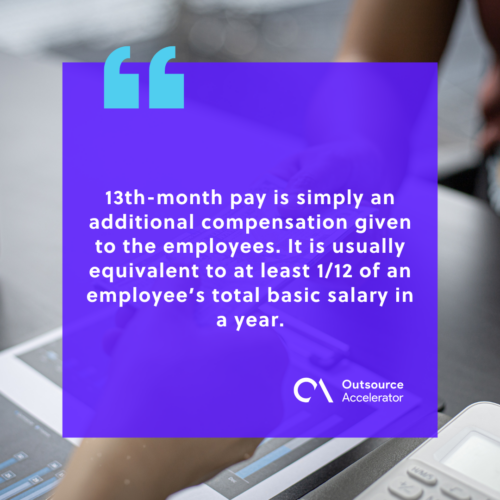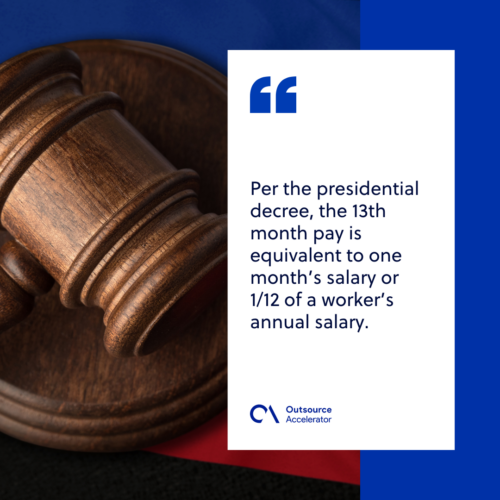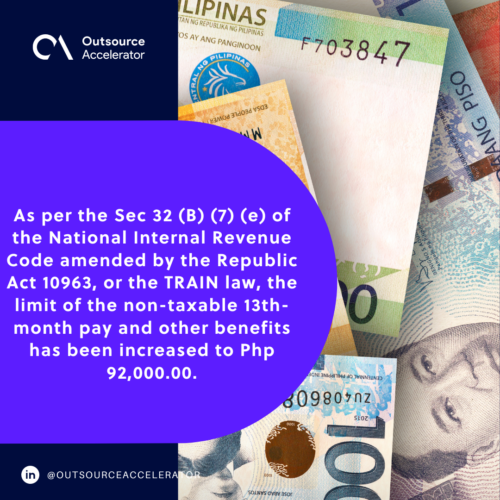An introduction to 13th month pay law and computation

It’s that time of the year again that every employee looks forward to: the BER months. It is the countdown for the Christmas season, which connotes cold nights, Christmas songs, holiday decorations, Simbang Gabi, and the much-awaited 13th-month pay.
Who else wouldn’t get excited to look forward to another year with a stable job and extra money for your savings?
However, not everyone has the privilege of getting this, especially freelancers and self-employed individuals.
This article will discuss the 13th month’s pay, the law covering this benefit, and why employers ‘should’ give this to their freelancers as well.
What is the 13th-month pay?
13th-month pay is simply an additional compensation given to the employees. It is usually equivalent to at least 1/12 of an employee’s total basic salary in a year.
Depending on the country, the government may or may not require the distribution of this benefit. Surprisingly, most developed countries, such as the US and UK, are not required to provide this bonus.
Most Latin American countries, meanwhile, give 13th-month pay in up to three installments. Only Chile practices “customary thirteenth-month pay” given either as a one-time lump-sum or two installments in September and December.

13th-month pay law in the Philippines
By virtue of Presidential Decree No. 851, 13th-month pay is a mandatory cash benefit given to all qualified employees on or before December 24th of the current year so that employees may properly celebrate Christmas and New Year.
An amendment of the said presidential decree specified that the 13th-month pay must be given to all rank-and-file employees on or before December 24.
The difference between the 13th-month and 14th-month pay
The 13th month’s pay is different from the 14th month’s pay or a Christmas bonus. While the 13th-month pay is mandatory in the Philippines, the 14th-month pay is only given according to the company’s practices and standards.
Also, employers are not required to give out bonuses to their employees. Even if they do, it’s either in the form of gift certificates or Christmas packages.
Some business process outsourcing employees receive a 13th and 14th-month pay in addition to their incentives.
Who is qualified to receive 13th-month pay?
Section 3 of the Rules and Regulations of the ’13th Month Pay law’ indicates that all local employees in the private sector are qualified to receive 13th-month pay, except in a few cases:
- Those with distressed employers. Companies continuing to gain losses more than profit may file for an exception from the Department of Labor and Employment.
- Household persons and those in the personal service, such as helpers, family drivers, gardeners, etc.
- Employees earning purely commission-based, task-based, or those paid with a fixed amount for a specific work, such as the case of freelancers.
Computation of 13th-month pay based on employment status
Per the presidential decree, the 13th month’s pay is equivalent to one month’s salary or 1/12 of a worker’s annual salary. This applies to rank-and-file employees with more than one year of tenure in a company.
For employees with less than a year of tenure, a pro-rated amount of not less than one thousand pesos (Php 1,000.00) shall be given to them, depending on their length of tenure in the company within the current year.
For example, we have provided a 13th-month computation table for an employee receiving a PHP20,000 basic monthly salary.
| Basic pay (monthly salary) | Length of tenure (in months) | 13th month pay* (amount to be received) |
| PHP 20,000.00 | 1 | PHP 1, 667.00 |
| PHP 20,000.00 | 6 | PHP 10,000.00 |
| PHP 20,000.00 | 12 | PHP 20,000.00 |
*13th month pay = (basic pay * length of tenure) / 12
This benefit does not cover additional monetary allowances and benefits such as:
- Cost of living allowances
- Unused vacation and sick leave credits
- Holiday pay
- Night shift differential
- Overtime pay
- Etc.
Different computation applies according to the employment status of a worker.

Minimum wage earners
Minimum wage earners are still eligible for 13th-month pay, regardless of their employment status.
However, unpaid absences and company shutdowns can affect the amount they can get.
DOLE released updated guidelines on the sample computation of 13th-month pay as applied to the basic wage in NCR.
Contractual employees
Contractual employees in the Philippines are fully protected by the law. As per Section 8 of the DOLE Department Order No. 18-A, contractual employees, including seasonal, relievers, and temporary workers, are entitled to rights and privileges under the Labor Code.
This gives them eligibility for 13th-month pay and other monetary benefits as provided in their employment contract or the Labor Code.
The 13th-month pay for contractual employees is computed similarly to regular workers. They can either receive a pro-rated pay calculated from their start date or an equivalent of their basic monthly salary.
Managerial employees
Employees holding managerial positions are not eligible to receive 13th-month pay. However, employers can provide this benefit at their discretion.
In addition, managerial employees can receive other monetary benefits from their companies. This includes Christmas bonuses and 14th-month pay.
Government employees
Originally, the 13th-month pay law only applied to private sectors. With this, government employees are not qualified to receive this benefit.
However, this does not mean they don’t receive bonuses at all. Government workers are entitled to the following monetary benefits.
14th-month pay
Government agencies can provide 14th-month pay based on their discretion. Employees can receive up to the full equivalent of their basic monthly salary depending on the amount indicated on the approved memorandum circular.
Bonuses
Government employees can receive mid-year and year-end bonuses as long as they meet the minimum tenure required for the bonuses. These biannual bonuses are the equivalent of 13th-month pay in the private sector.
Performance-based bonuses, meanwhile, have different calculations since they are based on the employee’s performance and contribution to the department or local government unit (LGU) they are in.
Resigned or terminated employees
According to the Bureau of Working Conditions, resigned or terminated employees are still eligible for the 13th-month pay “at any time before the time of payment.”
Based on their website, the 13th-month pay of a separated employee is “in proportionate” to the length of their stay for the current year. The amount they can get can be calculated based on two options.
- From the start date. For employees below one year of tenure, the calculation of 13th-month pay can start from the time they started working within the calendar year to their separation date.
- From the date of the last 13th-month pay. Tenured employees, meanwhile, can calculate their 13th-month pay from the last time they received it to their separation date.
Is the 13th month pay taxable?
Whether your 13th-month pay is taxable or not depends on the amount you receive.
The good thing is, as per Sec 32 (B) (7) (e) of the National Internal Revenue Code amended by the Republic Act 10963, or the TRAIN law, the limit of the non-taxable 13th-month pay and other benefits has been increased to Php 92,000.00.
This limit covers Christmas bonuses and other incentives.

Failure to give 13th-month pay to employees
Companies that fail to pay their employees their 13th-month pay are subject to legal charges unless they file for exemption.
According to the law’s Rules and Regulations, employers are required to file a report of compliance to the Department of Labor and Employment (DOLE) no later than the 15th of January of the following year.
Employees may file a money claims case to any DOLE branch upon failure to do so.
This, then, will be processed according to the Rules and Regulations of the Labor Code of the Philippines and the Rules of the National Labor Relations Commission. Once filed, the 13th month’s pay for the employees will be due and demandable.
BPO companies are also not exempted from this, even though their clients are outside the country. Since their service providers are based in the Philippines, they are still covered by the Philippine jurisdiction and are therefore accountable for failing to do so.
How about giving the 13th month to freelancers?
Though it is not required by law, why not consider giving them additional compensation?
Freelancers and remote workers may not be on your company’s payroll or hold an 8-to-5 job in your office, but like any employee, they continue to provide their skills and services to your business.
They invest time and resources into getting things done and seek the most effective way to complete their projects on time.
Many of them work without the usual benefits enjoyed by traditional employees. Even though it’s not mandatory, they will be delighted to see some extra money in their pockets for the coming Philippine holidays.
The government won’t make the 13th-month pay mandatory for no reason. This is beneficial to employees, especially in the upcoming holidays. Unfortunately, this isn’t the case for freelancers.
We encourage employers to give their freelancers their 13th month’s salary in addition to their basic salary as a sign of gratitude for their hard work.







 Independent
Independent




